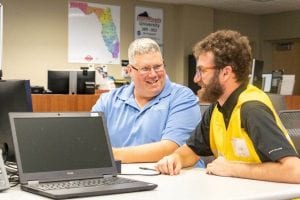Reducing Property Risks by understanding Natural Hazard Risks

By D’Ann Rawlinson
Our goal is to show people common natural hazards in their area, the average annual occurrence of those hazards and ways to mitigate risks, including estimated costs.
An interdisciplinary team of researchers led by Chris Emrich, associate professor of public administration at UCF and a member of UCF Coastal, is developing web tools to educate homeowners and renters on reducing property risks from natural disasters and increasing resiliency in cost-effective ways.
When choosing a home and neighborhood, people consider factors such as location, property prices, crime rates, and quality of the local school district. “We know most housing decisions are centered around affordability, but people often don’t account for annualized hazard losses,” says Emrich. “Our goal is to show people common natural hazards in their area, the average annual occurrence of those hazards and ways to mitigate risks, including estimated costs.”
The first line of defense to lessen long term disaster impacts is to live in a home protected from wind and water. “To understand real risk potentials and mitigation of those risks, we have to provide information in a way that makes sense and drives people toward better decisions,” says Emrich. Implementing good mitigation practices enables individuals and communities to recover faster by reducing their risk of loss. Living in Florida means hurricanes are a real risk with the question being when not if.
The project, titled The New First Line of Defense, is funded by a $3.4 million grant from the National Academies of Sciences, Engineering, and Medicine Gulf Research Program – Thriving Communities Grant. The UCF award was the largest of four projects funded by the program to enhance community resilience in coastal counties located in the U.S. Gulf of Mexico region. Focusing on 15 hazards common to coastal communities, the UCF led team plans to identify hazard risk scores for every parcel of land within the Gulf States. “It comes down to a lot of data gathering on the backend and using that data to develop a complete hazard picture for a particular area,” says Emrich. “We take the most appropriate science and turn it into the best tools and technologies for people to make better decisions.”
The team will develop user-friendly online tools, which homeowners, homebuyers, and renters could use to become more “hazards aware.” To ensure the information is accessible to the public, they are partnering with Redfin, a well-known real estate brokerage company. The team plans to build an application programming interface (API) that allows the software to communicate and share information, enabling real estate and other websites to pull data directly into their platforms. When a person views a house listing, a hazard score will be provided, alerting potential buyers to the hazards that may affect the home and offering ways to mitigate potential threats. An alpha version of their product will be released by October 2020.
The team has identified several stakeholder groups to test the product, including renters, homebuyers, homeowners, and community planners, among others. “As academics, when we find those nuggets of research that are transferable to society, I think the onus is on us to make sure that society understands. We want to make a difference,” says Emrich. Emrich says the team hopes to provide these tools to other well-known websites and social networking platforms such as Trulia, Zillow, and Nextdoor. In years two and three of the three-year project, the researchers want to get their tools into the hands of landlords, realtors, county commissioners, and other community stakeholders.
In the future, the team intends to expand their research and tools to the entire country. Researchers on the project span seven universities and multiple disciplines. In addition to Emrich, UCF’s contributors include:
- Engineering Assistant Professor Thomas Wahl
- Biology Assistant Professor Kristy Lewis
- Rosen College of Hospitality Management Assistant Professor Sergio Alvarez
- Political Science Assistant Professor Jacopo Baggio
- English Assistant Professor Sonia Stephens.
Emrich is an endowed associate professor of environmental science and public administration in the School of Public Administration and founding member of the National Center for Integrated Coastal Research. He received his doctorate in geography from the University of South Carolina. He worked for the Federal Emergency Management Agency (FEMA) as a geographic information systems specialist in the Hurricane Charley Joint Field Office — Mitigation Division and then as a web transparency liaison in the Gulf Coast Recovery Organization. He has been with UCF since 2016.
